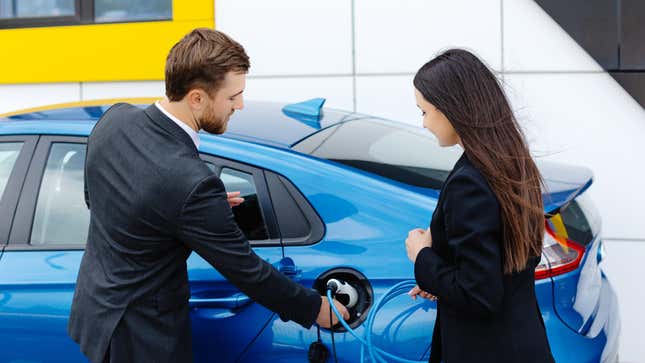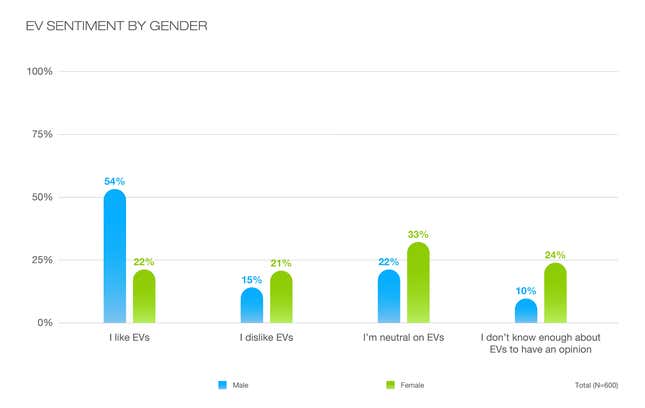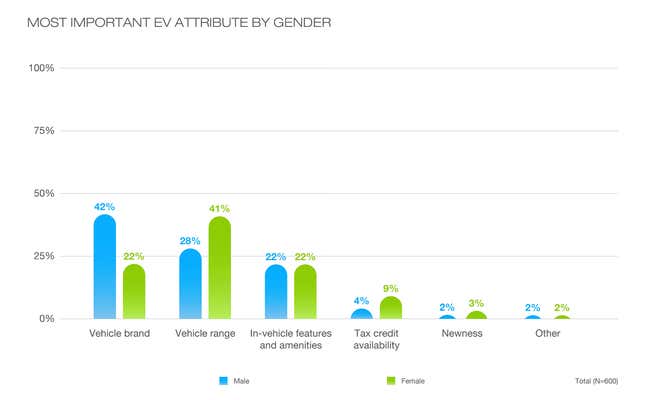
Despite EVs gaining wider acceptance in the U.S. market, a trend seems to be emerging among buyers based on gender. Men are far more likely to buy EVs than women, according to Edmunds. The reasons go beyond early adopter syndrome and have more to do with the nature of car buying, which is based on emotion. Men want EVs to make them feel a certain way, while women just want EVs to present a better value proposition than they do at the moment.
So far in 2023, just over two thirds of EV buyers were men (67 percent) and one third were women (33 percent.) Edmunds says automakers and dealers are not marketing correctly to women, but that seems like it’s always been the case.
The EV purchasing breakdown compares unfavorably to the industry average, which includes ICE-equipped vehicles and plug-in hybrids. Across the U.S. market, the buyer breakdown was 59 percent men and 41 percent women, per Edmunds. Now, we could say that men buy more cars than women, overall, which casts the EV gender gap in a less mysterious light.

But men are notably making more emotional decisions when buying EVs. Men are just plain excited about the idea, while women say they’re still on the fence and are biding their time until EV technology becomes more ubiquitous or well known. Per Edmunds:
More than half (54%) of men surveyed indicated that they liked EVs, compared to just 22% of women. However, nearly a quarter (24%) of all women surveyed stated that they do not know enough about EVs to have an opinion.
[...]
It’s dangerous territory for potential customers to be neutral or not have an opinion about EVs since car buying can be an emotion-driven process. Unique selling points and practical reasons for purchasing an EV need to be proactively communicated to the female buying audience so they can connect on a personal level with a potential EV purchase.
Men are more likely to buy an EV for the privilege of being the first to own any newfangled tech. Early adopter syndrome is real, and men are much more susceptible to it: 31 percent of men said being the first to have new tech was important to them, while women were at 13 percent in the same metric.
Men are also more likely to favor a certain brand and stick with it long term, a nod to the tribalism inherent in vehicle preference. The Edmunds survey says 42 percent of men consider vehicle brand to be the most important attribute of an EV compared to 22 percent of women. Women, on the other hand, are more interested in EV range, which 41 percent of women cited as the most important attribute compared to 28 percent of men.

The range of an EV is related to other pragmatic issues that women reportedly consider when switching (or not) to fully-electric cars, such as value. Since the general public is still more or less concerned with the “low range” of EVs, women are more likely than men to buy a plug-in hybrid. The idea being that EVs are still not a good value relative to that of PHEVs. Of course, the price of EVs is part of the problem, what with the average price being nearly $60,000.
It’s no wonder that women are more likely to opt for a plug-in hybrid, which serves as a stepping stone between combustion-powered and fully-electric cars. Women reportedly cited a preference for EVs priced at under $30,000, or half that of the current industry average for electrics. Edmunds calls that unrealistic, but guess what? It’s not just women that are asking for cheaper EVs. We all are.